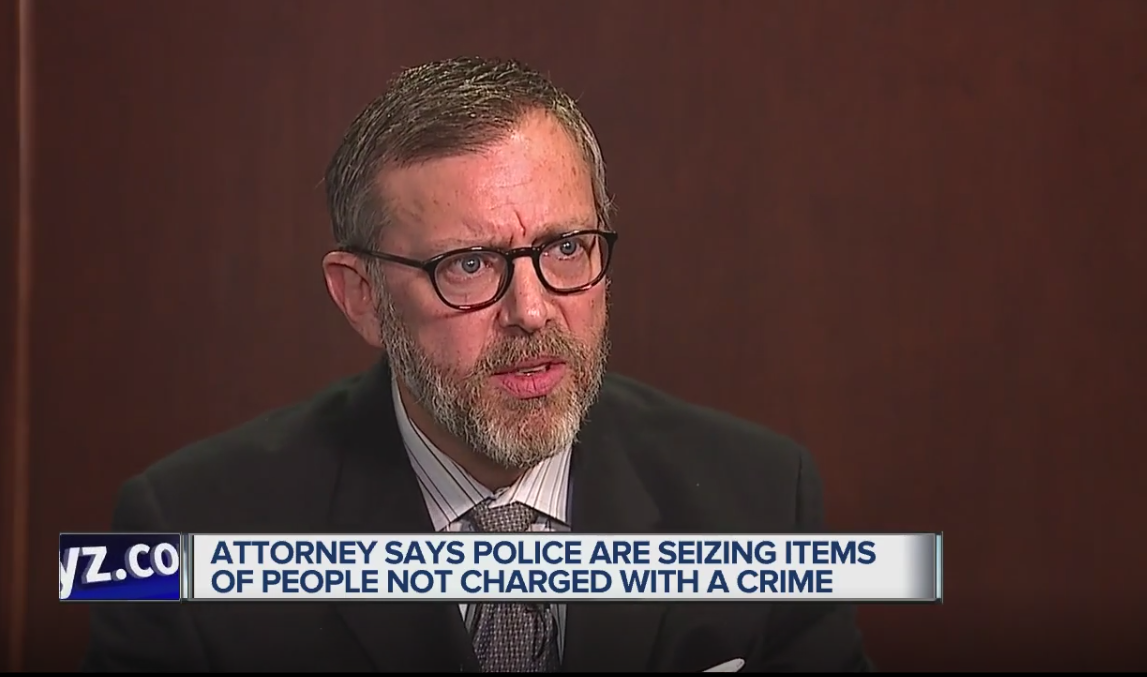Michael Komorn has worked tirelessly for his clients at Komorn Law PLLC to return property seized and forfeited to the police. The items and property seized often has absolutely no medical marijuana (or any crime at all) connection whatsoever. Just looking at the list of things seized, none of it makes sense. 4 wheeler? Gas generator? 401k retirement account? Cars purchased 20 years ago and restored. Ladders, children's birthday money taken out of their Hallmark birthday cards. iphones, ipads, computers, cash, gold rings, guns. The police will take anything of value that they can in any medical marijuana case.
As an expert in civil asset forfeiture, Michael Komorn and Komorn Law PLLC attorney Jeff Frazier educate other lawyers on the steps and pitfalls of forfeiture cases on ICLE.

Rep. Lucido says bill would prevent police from seizing innocent people's stuff


LANSING, Mich. (WXYZ) - You have seen the movies. Police seize the stuff of crime bosses to stop a network of criminals, but could it happen to the average person? Could your stuff be seized even if you aren’t charged with a crime? Defense attorneys say it is happening all the time here in Michigan, especially to medical marijuana users.
When police seize stuff they believe was bought or is money made from a crime, they start what is called a civil asset forfeiture process.
“It allows law enforcement and benefits everybody, to remove the profit motive from drug dealing,” said Robert Stevenson, the Executive Director of the Michigan Association of Chiefs of Police.
Police say they only seize stuff they truly believe is connected to crimes. Often people are never charged with a crime or their belongings are kept after charges are dropped.
“I did not get bound over by the judge but they still have my stuff,” said Ginnifer Hency as she testified before state lawmakers in 2015.
She said she has multiple sclerosis and is a medical marijuana patient. She said even after a judge cleared her of any crime, the prosecutor fought to keep her valuables.
Lawmakers changed the law to raise the burden of proof, but people are still voicing complaints.
“I felt robbed, like a highway robbery,” said John Hamann of what happened to him and his dad Ron Hamann.
The Hamanns say they believe it is about making money for law enforcement. When medical marijuana became legal, they applied for cards to be caregivers and patients.
“I thought everything was legal,” said Ron.
“Everything you are supposed to do. I followed all the weights, all the counts and everything like that, but it doesn’t matter. They take everything and say gotcha,” said John.
They say almost three years ago police seized all their valuables. They say about two years later, only when they came close to winning their belongings back, were they charged with manufacturing marijuana. To them, it felt like a shakedown.
“WCPO’s longstanding office protocol is that any civil forfeiture case and the associated criminal cases are kept separate. In other words WCPO has a fire wall in place..The civil and criminal cases are completely independent from one another,” said Maria Miller of the Wayne County Prosecutor’s Office in a statement.
The prosecutor’s office says the Hamann's face the charges because it is alleged that they had over 20 pounds of marijuana and 69 marijuana plants.
Komorn, their attorney says that doesn’t make sense as a legal allegation. Ron had a patient card and proof he was a caregiver for two patients. He was allowed to possess 36 plants. John had a patient card and was a caregiver for 4 patients. He was allowed to possess 60 plants. As for the weight, Komorn says pictures submitted as evidence show the marijuana weighed was unusable in that it was wet and included stalks thrown in the garbage. Komorn says only usable marijuana is supposed to count in weight limitations.
The Hamanns say what was seized has nothing to do with marijuana. They say police seized their 401Ks, which they contributed to through their jobs at a home remodeling company. Police told them they could because the money was from drugs.
“I don’t understand it at all. It is on my paystub. It shows where my money comes from. It is all legal,” said John Hamann.
“All the money is traceable from his job into his 401k,” said Rep. Peter Lucido (R-36th District). “There is no logic or reason for the police to do what they are doing. But they have the right to do it under state law.”
Representative Peter Lucido has introduced House Bill 4158. He says police all too often seize property from the innocent.Taking a look at the numbers. The state’s asset forfeiture report says in 2016 police seized more than 15 million dollars in property. In about ten percent of those cases no one was charged. He wants the law changed, so that police would only be able to keep your stuff if there is a conviction, forcing police to at least charge people in order to keep their belongings.
“They have a right to seize it and put it into an evidence locker, but if they don’t charge the person, what did the person do wrong under the law?” asks Lucido.
“It does put people in a tough spot. It puts a person in a tough spot if those proceeds are from illegal activity,” said Stevenson.
Law enforcement leaders, like Stevenson, say If someone wants to get their stuff back, all they have to do is answer the questions investigators have. It has the potential to be a powerful tool in the fight against crime.
“One of the things you have to do in a civil case, which you do not have to do in a criminal case, is you have to answer questions,” said Stevenson.
Michael Komorn argues that it hurts justice. He says he takes on clients who can’t afford his services, because their assets are seized.
“The idea that the government just takes it, and the idea that by possessing it it becomes theirs, and the burden shifts to the owner of it to prove that the property is not guilty or that they got it legally, goes against the grain of what people expect from our legal system,” said Komorn.
John and Ron Hamman says they believe they will be found not guilty - but in the meantime are being punished.
Rep. Lucido will have the chance to make his case that this law needs to be changed during a hearing in Lansing on February 6.
http://www.fox2detroit.com/news/vibrator-taken-during-marijuana-police-raid-says-woman
Read more about criminal asset forfeiture and civil asset forfeiture on my blog.
http://komornlaw.com/does-freezing-defendants-untainted-assets-violate-right-to-counsel-of-choice/
http://komornlaw.com/civil-asset-forfeiture-guilty-until-proven-innocent/
http://komornlaw.com/editorial-court-puts-limit-on-police-stealing/
http://komornlaw.com/feds-using-forfeiture-to-their-advantage/
http://komornlaw.com/mich-cops-seized-24m-in-2014-in-drug-cases/
http://komornlaw.com/house-speaker-michigan-must-reform-asset-forfeiture/
http://komornlaw.com/court-pot-as-tip-no-reason-for-police-to-seize-car/
http://komornlaw.com/vibrator-taken-during-marijuana-police-raid-says-woman-fox-2/
http://komornlaw.com/police-ransack-charges-dropped/
http://komornlaw.com/2015-michigan-state-police-asset-forfeiture-report-final/
Meet Some Law Enforcement Officers Who Support Forfeiture Reform
Michigan Legislature should strengthen property rights
While many interest groups representing law enforcement employees oppose reforming civil asset forfeiture to require a criminal conviction before the state can take ownership of a person’s property, some law enforcement officers support the changes.
In the Traverse City Record-Eagle, reporter Kyle Kaminski gets comments from a variety of law enforcement officials about forfeiture generally and about a bill that would reform how it's used in Michigan. Here are the responses:
“It would be easier for us and more fair to those who are having their property forfeited to have a criminal conviction,” said Grand Traverse County Undersheriff Nate Alger. “Our system is based on being innocent until proven guilty.”
…
Attorney General Bill Schuette this week said conviction before [forfeiture] is a “good principle” to maintain.
…
County Prosecutor Bob Cooney noted most local forfeiture cases include a criminal conviction but said current laws force them to continue. “I wish the state would better fund narcotics teams and not incentivize them in any way to go after forfeiture dollars,” Cooney said. “At the same time, those laws were set up to take away profits from those selling illegal drugs. That’s the idea.”
…
“I’m a little concerned that by tying them to a criminal conviction, it’s going to bring me people who try to barter their way out of things,” Kalkaska County Prosecutor Mike Perreault said. “I could also see the argument then that we’re only prosecuting people to take their stuff.”
Benzie County Sheriff Ted Schendel said “common sense” dictates police first need to prove someone guilty of a crime. “I know forfeiture is a huge asset, especially for drug enforcement teams. There’s never enough money to fund those things,” Schendel said. “But I like to err on the side of the people and the Constitution.”
The law enforcement officials are joined by others in their field who support the conviction requirement.
House Bill 4158 would do the following:
- Require a criminal conviction, or plea agreement, prior to any forfeiture taking place for assets under $50,000.
- Allow for exemptions for people who die, are deported or abandon their property.
This properly balances protecting innocent people’s property rights with enabling law enforcement to forfeit property that was either obtained with proceeds from illegal activity or used for illegal purposes.









1 Comment
Recommended Comments